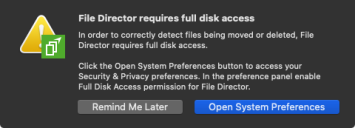This page refers to an older version of the product.View the current version of the online Help.
Getting started with File Director Mac
In this section:
- Install
- File Director for macOS 10.15, Catalina
- Login
- Failed login
- Forgotten password
- Open File Director
Install
Your IT Support department will either provide you with a download location when they notify you that the File Director service is available, or they will deploy the installer package to your device. Typically, the installer package is in a DMG (disk image) file. Once you have downloaded or accessed the DMG, you need to open the DMG to access the installer package.
You must have administrator privileges to install File Director.
- Double-click the File Director Installer.pkg file.
- From the Introduction screen, click Continue.
-
Read the terms of use, and click Continue. You can print or save the terms of use by clicking the appropriate buttons.
A dialog displays giving access to the license agreement.
- If you agree with the terms of the license agreement, click Agree. If you want to read the agreement again, click Read License.
-
From the Installation screen, click Install to complete the remainder of the installer.
You can click Change Install Location to select another disk on which to install File Director, but File Director can only be installed on the root directory.
- When prompted, enter valid credentials to approve the installation, and click Install Software.
-
After the installation completes, click Close.
You can now open File Director. See Open File Director for more information.
File Director for macOS 10.15, Catalina
MacOS 10.15 delivers enhanced security of user data and requires the user to grant full disk access to the File Director application. Granting this permission requires administration privileges and is confirmed via the Security and Privacy preferences panel.
File Director checks for full disk access permission at start, and then at regular intervals. If access is not permitted an alert message is displayed:
Login
You File Director login credentials are supplied by your IT Support Team and you use the same ones for all File Director clients. Your credentials consist of the following elements:
| Element | Details |
|---|---|
| Server address | The address of the server to and from which you will upload and download files. |
| Username | Your username is a combination of your login
name and domain name - [email protected] or domain\username. Although it can be a similar format, your username is not an email address. |
| Password | This is usually the password you use to log in to your work computer. |
The login can be prepopulated with your credentials by the administrator, and you may not be able to alter them. Contact your IT Support if you experience issues logging in.
Failed log in
You may not be able to log in because of your credentials, server connection, or due to restrictions your organization has put on File Director use. You can receive the following error messages:
Incorrect credentials
The server name, username, or password you have entered is incorrect. Enter your credentials again and if you are still having difficulties or have forgotten your password, contact your IT Support department.
Server is unavailable
Try again when your server is running.
Login is restricted by policy settings
Organizations can configure a range of settings to manage users, which may stop you accessing File Director.
- File Director is not available on your device type - Your organization has prohibited File Director use on your device type.
- Your IP address has been restricted - Your IP address falls outside the range of valid IP addresses set by your organization.
- You have exceeded the maximum unsuccessful login attempts - You have been locked out of File Director due to too many login failures.
Contact your IT Support department for help with logging in and for further information about policy settings.
Forgotten password
If you can't remember your password, username, or server address, contact
your IT Support department.
Your password is usually synchronized with the one you use to log in to
your work computer. If you change this password, you must update your
password in File Director.
Open File Director
File Director does not launch automatically. You can open File Director as follows:
- In Finder, go to Applications, and double-click File Director.
- Open Launchpad, and click File Director.
- Search for File Director in Spotlight Search, and double-click the File Director application in the search results.
When File Director is opened, a File Director icon with a menu appears in the dock and the toolbar.
Whether the icon displays in the dock is configurable in File Director Preferences.
For more information, see Mac File Director Settings.
